Institute Announces Partners in Pro Bono Initiative Focused on Social Cohesion through the Arts
August 11, 2021
WASHINGTON, D.C. — The DeVos Institute of Arts Management at the University of Maryland will provide eleven arts and cultural organizations focused on strengthening or developing arts programming to enhance social cohesion with pro bono consultation services. The opportunity, underwritten in full by the University of Maryland, was open to organizations across the country through a competitive application process. The Institute is pleased to announce the following eleven participating organizations:
- Chinese Culture Center San Francisco San Francisco, California
- Hi-ARTS New York, New York
- SPOKE/ Medicine Wheel Productions Boston, Massachusetts
- Mexic-Arte Museum Austin, Texas
- Mosaic America Saratoga, California
- Neighborhood Design Center Baltimore, Maryland
- PA Guild of Craftsmen Lancaster, Pennsylvania
- Sandy Spring Museum Sandy Spring, Maryland
- Springfield Cultural Partnership & Springfield Community Music School Springfield, Massachusetts
- St. Louis Arts Chamber of Commerce St. Louis, MO
- Street Poets Los Angeles, California & Miami & Globe, Arizona
At a pivotal moment in our nation’s journey — one that calls for justice, reconciliation, restitution, and healing — the initiative will assist these organizations in the development and implementation of arts programming that promotes engagement between parties that may not otherwise engage in constructive or creative dialogue.
Specifically, the program recognizes the disproportionate and unacceptable impact that structural and racial inequity has had within BIPOC communities and prioritized proposals that sought to support BIPOC-led and BIPOC-serving organizations. Further, the program was designed to support projects with a systems analysis or social justice framework that demonstrate long-term commitments, in contrast to one-off or project-based efforts.
Programs selected range from city-based initiatives that connect neighborhoods and communities historically separated by racial and economic divides to regional and national programs that bridge communities across socio-political, cultural and urban-rural spectrums. They encompass thought leadership centers, community art projects & dialogues, festivals, youth development programs, artist residencies, cultural exchanges, coalitions, and public advocacy campaigns. Collectively, they leverage performance art, visual art & design, public art, urban design, traditional folk arts, fine craft, poetry, and hip-hop, among others, and engage partners in public health, local government, social services, criminal justice, education, and urban planning.
Program Focus
The oft-touted role of the arts — to create community, understanding, and empathy — has historically succeeded in engaging individuals and groups already inclined toward conversation with each other. This gathering of like minds in common experience – often bound by geography, background, or interest – has played an important role in efforts to strengthen community and cohesion.
Building on this foundation, this program will support strategies that connect, through creative practice, ways of life that may not naturally collaborate or see eye-to-eye. As such, the initiative is designed to serve projects that seek to build alliances, partnerships, and sustainable working engagements between communities historically separated by differences defined by geography, economics, race, identity, politics, privilege, or other impactful social determinants.
The six-month planning process will support organizations in advancing program design, evaluation, visibility, and funding. Additionally, the process will assist organizations with their plans to build institutional wealth in the form of working capital, reserves, and/or other relevant instruments.
This dual focus — on program development and institutional wealth — recognizes the historical lack of equity in American communities and American philanthropy, and the importance of building institutional wealth for the long-term sustainability of non-profit organizations.
Program Leadership
In support of the program, the Institute has engaged the expertise of leaders in the design and implementation of arts programming that improves cohesion and equity in American communities. These leaders will work with Institute President Brett Egan and other Institute Senior Consultants to advise participating organizations on the development or strengthening of relevant programs. This effort recognizes that the ambition to increase understanding, cooperation, empathy and equity through creative practice requires nuance and craft; leaders identified to support this aspect of the planning process have each, in their fields, developed and implemented successful programs focused on social cohesion and/or equitable systems change.
Special Advisors include:
- Bryan Joseph Lee, New York-based creative producer, arts marketer, and civic organizer, and Founder CNTR Arts
- Cayenne Harris, Vice President of Education and Community Engagement, University Musical Society at the University of Michigan
- Gayle Isa, Founder and former Executive Director, Asian Arts Initiative
- Jane Golden, Founder and Executive Director, Mural Arts Philadelphia
- Jay Owen Eisenberg, Minneapolis-based actor, educator, director, and facilitator
Advisor Biographies
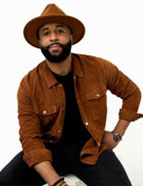 Bryan Joseph Lee (he/him) is a creative producer, arts marketer, and civic organizer with 12 years of arts management experience and a decades-long career building creative communities at a local, national, and international level.
Bryan Joseph Lee (he/him) is a creative producer, arts marketer, and civic organizer with 12 years of arts management experience and a decades-long career building creative communities at a local, national, and international level.
Most recently, Bryan served as Director of Public Forum at The Public Theater in New York City, where he investigated civic organizing and cultural changemaking at one of the nation's leading off-Broadway theater companies. As an artistic curator, his work centers the experiences of Queer, Trans, and BIPOC communities on stage and in our world. Bryan has also independently produced and programmed several Black Queer artists at venues like La Mama Theater Company, The Shed, and Little Island in New York City.
Before The Public Theater, Bryan led marketing and communications at Round House Theater, a regional theater company based in Bethesda, MD. There, he oversaw earned revenue and institutional marketing with a specific focus on cultivating diverse audiences through relationship building. During his tenure, Round House increased subscription and single ticket revenue by 51% and achieved the highest-grossing and highest-attended seasons in their 40-year history. Bryan has also worked with the Baltimore Symphony Orchestra, the Prince George's African American Museum, and Woolly Mammoth Theatre Company.
Bryan has guided numerous audience engagement initiatives around the world, including recent projects in Salem, Oregon; Alexandria, Egypt; and Perth, Australia. He is a frequent speaker on the topics of building relevance and resilience for arts organizations, and has delivered keynote speeches at the PAC Australia Conference in Sydney, and the Creu Cymru Annual Conference in Wales. Bryan is a 2018 Fellow of the DeVos Institute of Arts Management at The University of Maryland, and was named a 2016 Rising Leader of Color by Theater Communications Group (TCG). He holds a degree in International Relations and Theater from Dartmouth College. .
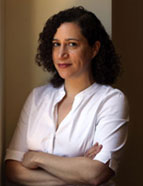 Cayenne Harris currently serves as Vice President of Education and Community Engagement for the University Musical Society (UMS) at the University of Michigan. Cayenne began at UMS in February 2020 after 8 years as Vice President of Lyric Unlimited, the education/community engagement arm of the Lyric Opera of Chicago, and 12 years in ascending roles at the Chicago Symphony Orchestra, including Director of New Initiatives for the CSO’s Institute for Learning, Access & Training.
Cayenne Harris currently serves as Vice President of Education and Community Engagement for the University Musical Society (UMS) at the University of Michigan. Cayenne began at UMS in February 2020 after 8 years as Vice President of Lyric Unlimited, the education/community engagement arm of the Lyric Opera of Chicago, and 12 years in ascending roles at the Chicago Symphony Orchestra, including Director of New Initiatives for the CSO’s Institute for Learning, Access & Training.
A French horn player, Cayenne received music degrees in performance from San Francisco State University and Yale University in addition to a Certificate in Philanthropy and Non-Profit Fundraising from Northwestern University. She was twice named one of NewCity Magazine’s 50 Outstanding Leaders of Chicago’s Theater, Dance, Opera, and Comedy Culture and has served as a speaker at numerous professional conferences including Opera America, the World Opera Forum, the League of American Symphony Orchestras, and Grantmakers in the Arts. Cayenne is a 2022 Fellow in the Institute’s Global Fellowship Program.
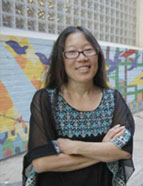 Gayle Isa is Founder and former Executive Director of Asian Arts Initiative, a multi-disciplinary community-engaged arts center in Philadelphia dedicated to fostering positive change through storytelling, dialogue, and cross-cultural community building.
Gayle Isa is Founder and former Executive Director of Asian Arts Initiative, a multi-disciplinary community-engaged arts center in Philadelphia dedicated to fostering positive change through storytelling, dialogue, and cross-cultural community building.
At Asian Arts Initiative ,she led the creation of programs such as the In/flux exhibitions of site-specific installations responding to and shaping the constantly changing dynamics of the community; the Artists Exchange which involved artist peer-led workshops and commissioning of new work in response to current social themes; and the organization’s Social Practice Lab, which embedded artists-in-residence throughout the socio-economically and racially diverse neighborhood of Chinatown North. She also led a successful $6.5 million campaign to purchase and renovate Asian Arts Initiative’s current building as a 24,000 square foot multi-tenant arts facility that serves as a hub for creativity and community placekeeping; and positioned the organization to lead a neighborhood-wide cultural planning process that brought together diverse stakeholders to define a common vision for the neighborhood’s future.
Gayle has been a Douglas Redd Fellow focused on arts and community development and was the first Asian American appointed to serve on the Pennsylvania Council on the Arts. She has served on the boards of the Philadelphia Cultural Fund, the Greater Philadelphia Cultural Alliance, the national Consortium of Asian American Theaters and Artists, and the National Performance Network. After celebrating Asian Arts Initiative’s 25th anniversary, she relocated back to her hometown of Los Angeles and is appreciating the opportunity to reconnect with extended family, friends, and local culture.
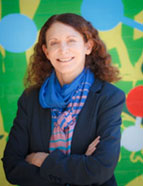 Jane Golden has been the driving force of Mural Arts Philadelphia since its inception in 1984, overseeing its growth from a small city agency into the nation’s largest public art program and a global model for transforming public space and community through art. Under Golden’s direction, Mural Arts has created over 4,000 works of public art through innovative collaborations with community-based organizations, city agencies, nonprofit organizations, schools, the private sector, and philanthropies.
Jane Golden has been the driving force of Mural Arts Philadelphia since its inception in 1984, overseeing its growth from a small city agency into the nation’s largest public art program and a global model for transforming public space and community through art. Under Golden’s direction, Mural Arts has created over 4,000 works of public art through innovative collaborations with community-based organizations, city agencies, nonprofit organizations, schools, the private sector, and philanthropies.
Reimagining the intersection of art and public space to address societal challenges, she has developed groundbreaking programs that transform practice and policies related to youth education, restorative justice, environmental issues and behavioral health. Golden has overseen a series of increasingly complex, ambitious, and award-winning public art projects, and launched the knowledge-sharing Mural Arts Institute in 2017 to help guide best-practices across the globe.
Sought after nationally and internationally as an expert on urban transformation through art, Golden has received numerous awards for her work, including the Eisenhower Exchange Fellowship Award, the Philadelphia Award, the Hepburn Medal from the Katharine Houghton Hepburn Center at Bryn Mawr College, the Philadelphia Sketch Club Medal and Philadelphia Magazine’s Trailblazer Award. In 2018, she received the Anne d’Harnoncourt Award for Artistic Excellence from the Arts + Business Council of Greater Philadelphia, and the Dare to Understand Award from the Interfaith Center of Greater Philadelphia. She is an adjunct professor at the University of Pennsylvania, and serves on the Mayor’s Cultural Advisory Council, the Penn Museum Advisory Committee, and the board of directors of The Heliotrope Foundation.
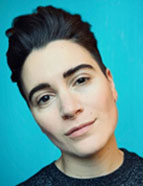 Jay Owen Eisenberg (He/Him/His) is a Minneapolis-based actor, educator, director, and facilitator. Before relocating to the Twin Cities in 2015, he was a lifelong New Yorker. He is a White, Jewish, queer, transgender man in his 30s who is often mistaken for one of his high school students.
Jay Owen Eisenberg (He/Him/His) is a Minneapolis-based actor, educator, director, and facilitator. Before relocating to the Twin Cities in 2015, he was a lifelong New Yorker. He is a White, Jewish, queer, transgender man in his 30s who is often mistaken for one of his high school students.
Jay's approach to teaching emphasizes empowerment, experimentation, and collaboration at the intersection of arts and advocacy. His backgrounds in sex education and professional theatre led him to create dynamic curriculum around Health, Wellness, and Consent for young performers in training. He encourages his students to view health and wellness as systemic, social, and ecological issues deeply informed by power and privilege, and his classes explore the ways in which the arts and culture sector often replicates and amplifies these power dynamics. Jay teaches with Upstream Arts, Saint Paul Conservatory for Performing Artists, the University of Minnesota, and the Performing Institute of Minnesota. He is a frequent guest teaching artist with a wide variety of theaters and arts education institutions around the country, and he was a member of the Guthrie Theater’s Guthrie Education Network Teaching Artist cohort from 2016 to 2019. Jay also works as an equity consultant, specializing in collaborating with arts organizations that seek to better serve LGBTQIA+ artists and community members, and he has been a member of Penumbra Theatre’s Equity Training facilitation team since 2018.
Jay received his BFA in Acting from New York University’s Tisch School of the Arts (Experimental Theater Wing). Since 2010, he has worked as a professional actor in film, television, and with regionally and nationally acclaimed theaters as large as Radio City Music Hall and as small as your living room. Jay was the recipient of a 2016 Creative Residency with SPACE on Ryder Farm, and a 2017 Minnesota State Arts Board Artist Initiative Grant. He is a proud member of Actors’ Equity Association.
This initiative is made possible with the support of the University of Maryland.